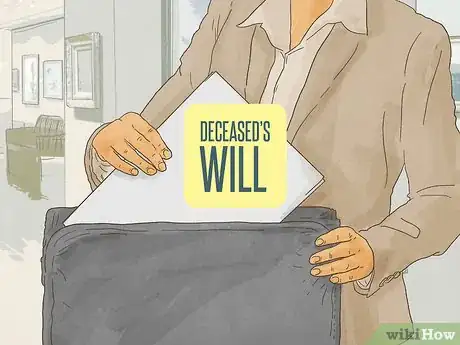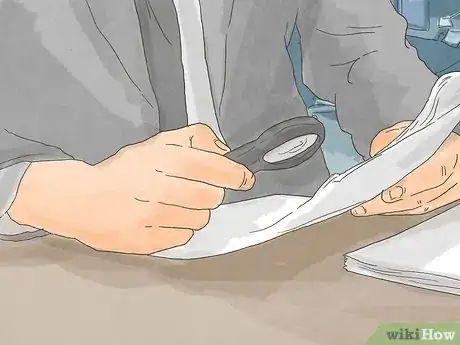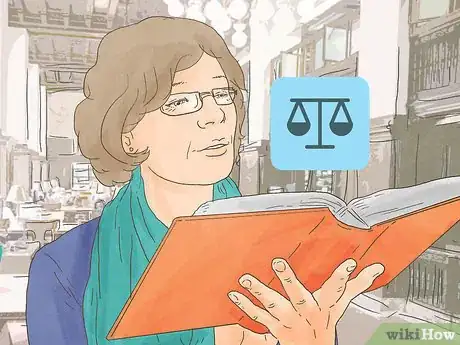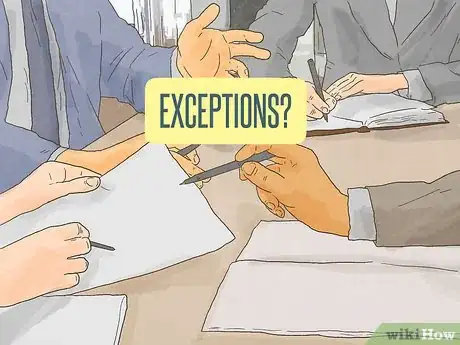This article was co-authored by Clinton M. Sandvick, JD, PhD. Clinton M. Sandvick worked as a civil litigator in California for over 7 years. He received his JD from the University of Wisconsin-Madison in 1998 and his PhD in American History from the University of Oregon in 2013.
There are 12 references cited in this article, which can be found at the bottom of the page.
This article has been viewed 69,447 times.
There are several different methods of dividing up personal property after a death depending on the circumstances that exist at the time of the death. If the deceased has a will, the will can dictate how the property should be divided; if not, a probate court can help with division. Because the law regarding the proper way to handle a will or the division of property in the absence of a will varies based on state law, it is highly advisable to hire an attorney to guide you through the specifics of the state laws and local procedures.
Steps
Following the Will
-
1Obtain the will. Finding a deceased person’s will, if one exists, may require physically finding the document among the person’s personal items, perhaps in their residence or their safety deposit box. Another way to determine if the deceased person has a will is to contact the person’s attorney or if the attorney is not known, publish an announcement of the death in a local paper asking anyone with information about the will to come forward. [1]
-
2Determine if the personal property is accounted for. Read the will and determine if the personal property is specifically mentioned in it.
- Some individuals will include a list or letter with their will that specifically directs certain property to go to specific individuals.
- In other situations, a will may dictate that all or some of the personal property will go to a particular class of people. For instance, a will might leave all the deceased person’s property to “all of my children who survive me.” In that case, the property may have to be further divided among that class either by the executor, who is the person appointed in the will to divide and distribute property and assets, or by the courts.
- In other situations, the property may not be mentioned at all and may fall into what is called the residue, or what is remaining once the other parts of the estate are accounted for. In that case, the executor or the courts may determine how the property is to be divided up if the residue is left to a class of individuals. [2]
Advertisement -
3File the will. Regardless of whether the will is clear or not, it must be filed in the local probate court upon the death of the person who wrote it. In most places, there is a time frame of 10 to 30 days since the day the will comes into your possession to file the will. [3]
- If there is an issue with the interpretation of the will that is not resolved by the executor or made clear by the language of the will itself, the court will attempt to resolve the issues by finding the original intent of the deceased person. The rules that the court will turn to do this vary by state and local procedures. [4]
- If the parties named in the will or other parties that believe they are entitled to property allege that the will is invalid or should be voided for some reason, they can contest the will in court. Contact your local probate court to determine the proper actions to take to begin will contest proceedings. [5]
Going to Probate Court
-
1Understand the applicable laws. If a will does not exist, the deceased person’s personal property may be divided and distributed by the courts through the probate process.
- The way in which personal property is handled in probate in each state varies greatly, therefore, the best way in which to begin probate proceedings is to seek the advice of an attorney.
- A number of states have adopted some form of the Uniform Probate Code (UPC), which will dictate intestate succession, or the order in which family members will be entitled to property in the absence of a will. [6]
- For instance, under the UPC, all property will be left to a surviving spouse first if the deceased person’s surviving children were the children of the decedent and the surviving spouse or if there are no descendants or parents of the deceased person. If there are descendants born out of a different marriage, or parents of the deceased, or if there is no surviving spouse, the UPC will dictate the specific division of power. [7]
-
2Appoint an executor. Since a will does not name an executor in this case, it is necessary to ask the court to appoint you as executor of the deceased’s estate so you can direct the estate through the courts. If not, you should find someone else to serve as the executor in order to start the probate process. [8]
-
3Execute the process. The way in which each specific probate court handles proceedings vary but a local, experienced attorney or the local court clerk’s office can give more specific information on the proper procedure. In general, the person appointed as executor must:
- file a request for probate;
- publish notice of the probate proceedings in a local publication such as a local paper;
- mail notice of the proceedings to any related parties or possible beneficiaries of property;
- file proof of notice being sent and that you published the proceedings locally with the probate court; and
- file other local required forms with the probate court. [9]
Exploring Alternatives
-
1Identify exceptions to the will. In certain circumstances even if a will exists it may not dictate how personal property should be divided.
- In some states, surviving spouses are entitled to a certain portion of the property by law. If the will does not give the spouse the required amount of the estate, it could be revoked by this part of the law. [10]
- Under other laws that may be applicable depending on the state, children that are not mentioned in the will may still have an interest in the property by law. This could be true especially if the child was born after the will was written. Investigate the law of your state to determine if this provision is applicable. [11]
-
2Find property that may not be subject to probate. Certain property of the deceased person, such as property was transferred to an irrevocable trust, will not be subject to the usual applicable probate process.
- Property that is jointly owned and items that have valid beneficiary designations, such as life insurance policies, may not be subject to probate and the usual succession of inheritance governed by the law of the state.
-
3Investigate summary procedures. Depending on the applicable laws of the state and the amount or type of personal property in existence as well as the number of potential recipients of property, summary or shortcut procedures may be available.
- For instance, in California, assets that are inherited by a surviving spouse without challenges can simply be executed by filling out and filing a Spousal (or Domestic Partner) Property Petition. [12]
- In addition, in a state such as California, if the total amount of property of the estate is under a certain amount (which is currently $150,000 in California), the probate estate can proceed in a streamlined, shorter fashion with the filing of simple forms such as affidavits, which simply describe the distribution and division of property. [13]
References
- ↑ http://www.nolo.com/legal-encyclopedia/finding-filing-the-will.html
- ↑ http://www.nolo.com/legal-encyclopedia/how-make-sense-will.html
- ↑ http://www.nolo.com/legal-encyclopedia/how-make-sense-will.html
- ↑ http://estate.findlaw.com/planning-an-estate/state-laws-estates-probate.html
- ↑ http://estate.findlaw.com/wills/reasons-to-challenge-a-will.html
- ↑ https://www.law.cornell.edu/uniform/probate
- ↑ http://estate.findlaw.com/planning-an-estate/understanding-intestacy-if-you-die-without-an-estate-plan.html
- ↑ http://www.nolo.com/legal-encyclopedia/accept-job-as-executor-estate-32439.html
- ↑ http://www.nolo.com/legal-encyclopedia/how-probate-process-works-information-32438.html
- ↑ http://www.washingtonlawhelp.org/resource/how-to-claim-the-personal-property-of-someone
- ↑ http://www.washingtonlawhelp.org/resource/how-to-claim-the-personal-property-of-someone
- ↑ http://www.courts.ca.gov/documents/de221.pdf
- ↑ http://www.nolo.com/legal-encyclopedia/california-probate-an-overview.html



































































